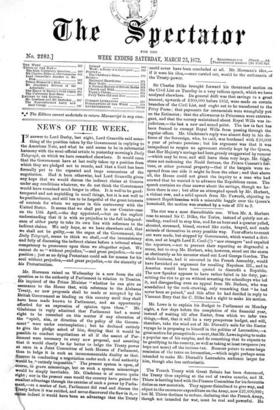Sir Charles Dino brought forward his threatened motion on the
Civil List on Tuesday in a very tedious speech, which we have analysed elsewhere. Its general drift was that savings to a great amount, upwards of £300,000 before 1852, were made on certain branches of the Civil List, and ought not to be transferred to the Privy Purse ; that payments for ceremonials were wrongfully put on the Estimates ; that the allowances to Princesses were extrava- gant, and that the secrecy maintained about Royal Wills was in- judicious,—the last a new and sound point. The law in fact has been framed to exempt Royal Wills from passing through the regular offices. Mr. Gladstone's reply was almost fiery in his de- fence of the Sovereign, who, he Laid, was burdened with £20,000 a year of private pensions ; but his argument was that it was inexpedient to reopen an agreement strictly kept by the Queen, that Her Majesty's savings had been grossly exaggerated by rumour —which may be true, and still leave them very large, Mr. GI* stone not reckoning the Neeld fortune, the Prince Consort's for- tune, or other personal property—that if the bargain were re- opened from one side it might be from the other ; and that above all, the House could not grant the inquiry to a man who had avowed that he wanted it to advance the Republican cause. The speech contains no clear answer about the savings, though we be- lieve there is one ; but after an attempted speech by Mr. Herbert, a violent row, and a solid speech from Mr. Fawcett, objecting to connect Republicanism with a miserable haggle over the Queen's household, the motion was crushed by a vote of 276 to 2.


































